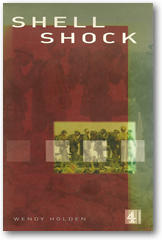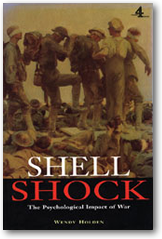Shell Shock: The Psychological Impact of War
Wendy Holden
 In the 100th anniversary year of the First World War, there has never been a better time for a reissuing of this comprehensive historical and psychological exploration of the terrible physical effects of sending men into battle.
In the 100th anniversary year of the First World War, there has never been a better time for a reissuing of this comprehensive historical and psychological exploration of the terrible physical effects of sending men into battle.
Shell shock was first believed to be caused quite literally by the shock of exploding shells but those who fled from conflict were shot for their ‘cowardice.’
Known as ‘malingerers’, ‘waverers’ or ‘lacking in moral fibre,’ the unfortunates who suffered genuine physical and psychological trauma from their experiences were often treated with unflinching brutality by psychiatrists and army medics under strict orders to get them back to the front line.
The death penalty for cowards was revoked after the First World War but little was done to alleviate the suffering of those who were conscripted for World War Two a few years later.
Killing, watching friends die, leading fellows to their deaths - all had a profound effect on those involved. And with Vietnam, Korea and the First Gulf War to follow, so the effects built to epidemic proportions.
There is a limit to what a soldier can endure before he ‘gets the wind up’ and becomes the victim of ‘hysteria’, battle fatigue, post-traumatic stress disorder or whatever terminology is in vogue.
Only in modern times have the psychological effects been fully explored and examined.
In this book’s exhaustive historical research and using the case histories and painful testimony of numerous veterans and their doctors, individuals tell their own stories of horrors to which they have been exposed, and of events that pushed them to the brink of human endurance.
Shell Shock also relates the history of military psychiatry and the dilemma of those entrusted to balance the demands to ‘cure’ soldiers and return them to battle with the needs of the soldiers themselves, who were struggling to understand their condition. A timeless book.
Read an extract from this book
Alternate/Foreign Covers
 |
 |
||
Paperback |
Hardback |
Read an Extract
Among those recruited to help cope with the steady flow of soldiers being sent back from the front was a middle-aged professor called Charles Myers, a former editor of the British Journal of Psychology…In December 1914, two months after his arrival in France, Myers treated one soldier who had been trapped in barbed wire in no man’s land – the neutral ground between the entrenched hostile forces. Several shells had burst right next to him, causing him no physical damage, but ever since he had been partially blind, and had lost the sense of taste and smell.
He had been in the best of spirits until the shells burst about him (Myers wrote). An eye-witness said his escape was a sheer miracle. Immediately after the shell burst in front of him, his sight became blurred. It hurt him to open his eyes and they burned when closed. At the same moment he was seized with shivering, and cold sweat broke out, especially around the loins. He was crying the whole time and wondering whether he was going blind. He kept turning over in his mind the succession of events from the beginning of the advance to the bursting of the shells.
Myers concluded that the shattering noise caused by the explosion of the eight-inch shell, showering the soldier with hot shards of metal, must have had some physical effect. ‘I was inclined to lay some emphasis on the physical shock produced by the bursting of the shell,’ he wrote. He believe such an explosion could have caused ‘an invisibly fine molecular commotion in the brain.’ In other words, some sort of physical concussion, damaging the nerves. In an article in the medical journal The Lancet a few months later he coined a rather more catchy phrase for the condition: ‘shell shock’.
The term spread like wildfire through Britain and in the trenches. From then on, it was applied to a whole host of odd medical phenomena which doctors didn’t know how else to account for. Once the phenomenon had a name, it gained in credibility and the cases that had begun as a tiny trickle at the outset of the war, arousing the interest only of the medical community, started to flood in thick and fast…
Numerous examples were cited of British officers and lower ranks suffering from the aspect of shell shock termed ‘hysterical paralysis’, the sudden inability to move a limb despite their being no physical cause. There was a sergeant with a paralysed trigger finger, which prevented him from firing his weapon, and an officer ordered to lead his men in a suicidal raid who found he could no longer speak…
What the Critics Say
“A very readable and highly informative book which broadens the scope of our understanding, and this is no mean achievement. By careful description and sobering critique, Holden has achieved broad coverage and a willingness to tell the story from the participant’s point of view.” The Psychiatric Bulletin
“A fascinating and well-presented exploration of the mind at war. Should be compulsory reading for everyone considering joining the armed forces.” Psychology Today
“An interesting book which brings this horrible illness up to date to show how it is still with us.” Mail on Sunday









